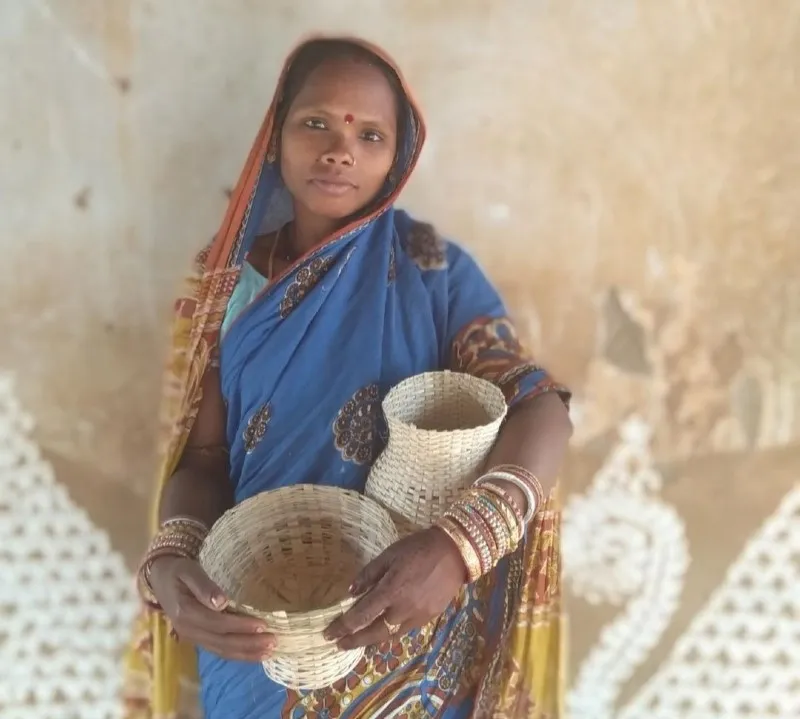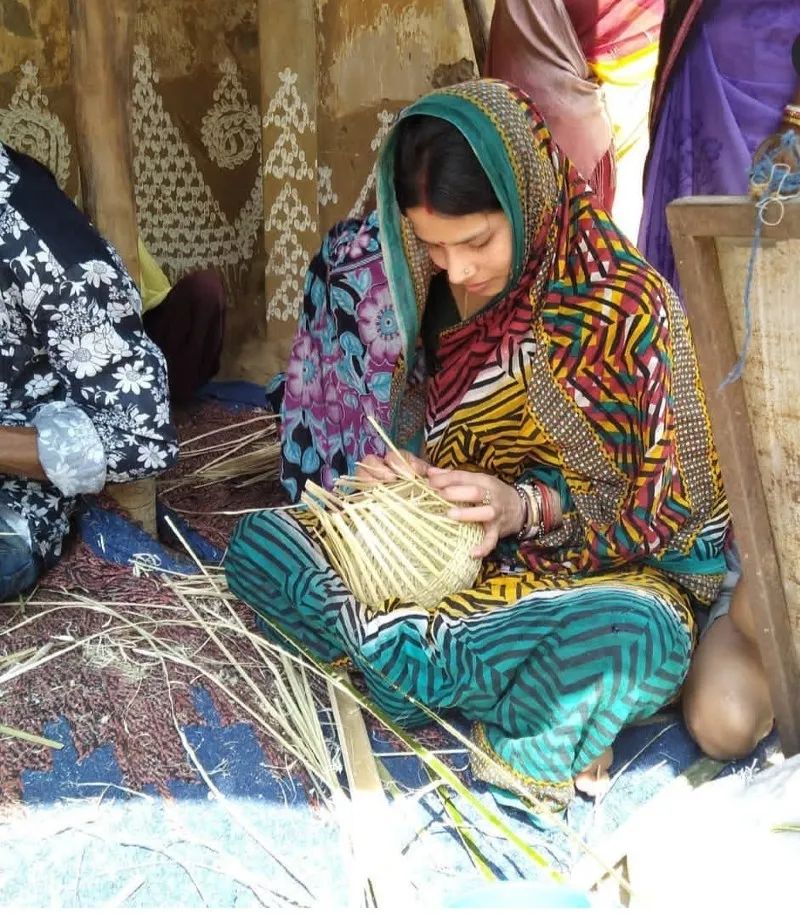World Bamboo Day: This woman entrepreneur’s social enterprise aims to empower tribal women in Odisha
Phalguni Joshi started bamboo startup Karmaar Crafts to empower the tribal women of Nilagiri in Odisha. The social enterprise uses bamboo to create a variety of sustainable offerings, including baskets, lamps, and other lifestyle products.
Phalguni Joshi was bothered by the fact that the only means of livelihood for the tribal community of Nilagiri, Odisha, was working in quarries, which proved detrimental to their health and well-being.
To create an alternate source of income, she started training tribal women in bamboo weaving.
Phalguni initially faced resistance from the community in learning the craft and taking it up as a source of income, but now more than 300 tribal women work with her. She trained the pilot batch using her own funds, after which the proceeds from the sale of the first batch of products were re-invested in the business, making the women and the business self-reliant.
Since bamboo is easily available in Odisha, weaving became an easy option and a good source of revenue generation for tribal women.
The founder has plans to train and recruit more women in Karmaar Crafts, and aims to go international with her bamboo products to show off this indigenous craft to the world. On World Bamboo Day, HerStory spoke to Phalguni on the challenges she faced and her plans for the future.
Edited excerpts from an interview:
HerStory (HS): What motivated you to start Karmaar Crafts?
Phalguni Joshi (PJ): The tribal community of Nilagiri, Odisha, had only one source of income - working at the nearby quarry. It affected their health and their children’s health too. The lack of alternative sources of livelihood motivated me to start Karmaar Crafts.

Karmaar Crafts is a social enterprise that trains tribal women in bamboo craft making as an alternative source of livelihood
HS: What were your initial challenges and how did you overcome them?
PJ: The only challenge was the initial reluctance, hesitation, and anxiety of the women to try and take up the bamboo craft. Since this craft was associated with a certain community, they were hesitant. Seeing that they were struggling to open up, I started learning the craft with them too. Some days, I would pick them up from their homes and drop them back after the training.
HS: Did you face any challenges due to your gender?
PJ: It is a sad reality that even in this era women are considered second-class citizens. The entrepreneurial community consists of over 80 percent men. I often come across men who think I am not fit for the role and expect that I am just helping a man out. I have lost business deals, great business deals because some people could not accept the idea of a woman entrepreneur. I don’t let these things affect me too much because I am proud to be a woman; I am proud to be an entrepreneur!
I am proud that I work with more than 300 women artisans in Odisha. This is only the beginning, and no gender gap and inequality can discourage and deviate me from achieving my goals.

Bamboo is easily available in Odisha, which made weaving an easy option and a good source of revenue generation for tribal women
HS: Is there a reason you focused on bamboo craft to start Karmaar Crafts?
PJ: Bamboo is one of the most resilient grasses. It has been used for centuries to build houses and has now evolved to help make amazing, sturdy, and artistic products that we use in our daily lives. Bamboo is not only used for craft or building purposes; the shoot is also an important health food as it is high in nutritional value, rich in proteins and carbohydrates. Bamboo was also easily available to the rural women as it grew on their own land…less expense and more profit!
The artisans work on an order basis because of the pandemic. They are paid for their services without any hidden fees. We also send our master trainers for various training sessions that will help them grow as entrepreneurs and artisans. The pandemic affected the income of artisans because Karmaar crafts started in December 2019. The pandemic hit us, but we are focused on growth.
HS: The digital revolution has helped so many startups. Has it benefited Karmaar Crafts?
PJ: The digital revolution has brought in a wide range of opportunities, bringing the world closer in terms of opportunity, markets, promotions, and cultures. Karmaar has benefited by showcasing the efforts of these women and giving them a platform and many opportunities.
HS: What does empowerment mean to you and the rural women you work with?
PJ: To me, empowerment means having a choice, and a voice. I grew up in one of the most orthodox societies of Rajasthan. I saw women in my family suffer because they didn’t have a choice or voice. In this world, empowerment of women is a baby step towards achieving gender equality.

Phalguni Joshi says the lack of alternative sources of livelihood for tribal women in Odisha motivated her to start Karmaar Crafts
HS: What are your plans for the next five years?
PJ: Karmaar Crafts is today proudly associated with 300 women artisans; we started with just three women! In the next five years we aim to go international by expanding our business overseas and stand as an inspiration for women in Indian rural societies. We plan to train 100 more women in bamboo craft in the next few months. We want to bring more artisans under the umbrella by providing training, which will help women achieve independence and self-reliance.
HS: What is the startup ecosystem like for women entrepreneurs?
PJ: I had a picture in my head that only male entrepreneurs who are successful. I was proven wrong when I entered the Her&Now Project. This is an initiative that empowers women entrepreneurs, and is implemented by GIZ, on behalf of the German Federal Ministry for Economic Cooperation and Development (BMZ), and in partnership with the Ministry of Skill Development and Entrepreneurship (MSDE), Government of India.
It gave me confidence, business knowledge, and the experience of a lifetime. I was given an opportunity to meet inspiring and brilliant women who share my story, empathise, and support me and my work.
Women entrepreneurs in the startup ecosystem have created a bond of sisterhood that will inspire future generations and young girls who dream big.
Edited by Teja Lele



![[Sustainability Agenda] How this startup is using innovative bamboo and nettle fabrics to create sustainable clothing](https://images.yourstory.com/cs/5/54bfb360112e11ecbdb4b127003811f4/Zoya-wahiImage-Tags-1631711667286.png?fm=png&auto=format&h=100&w=100&crop=entropy&fit=crop)




![[Product Roadmap] How dating app Aisle attracted over 3.4 million users across 193 countries](https://images.yourstory.com/cs/2/a9efa9c02dd911e9adc52d913c55075e/PRM-1605021665589.png?mode=crop&crop=faces&ar=1%3A1&format=auto&w=1920&q=75)